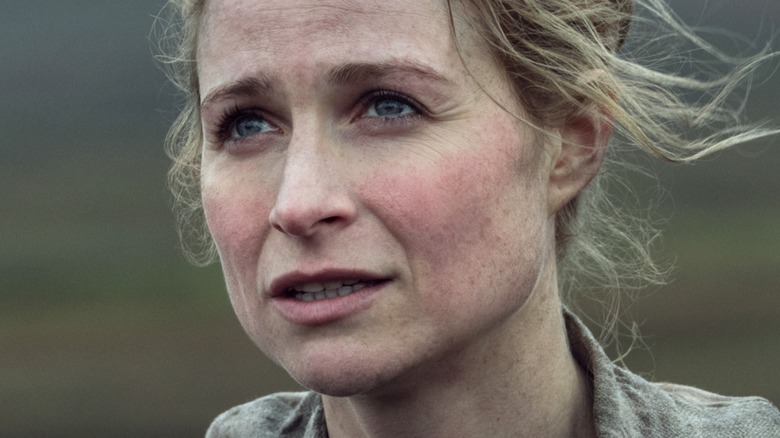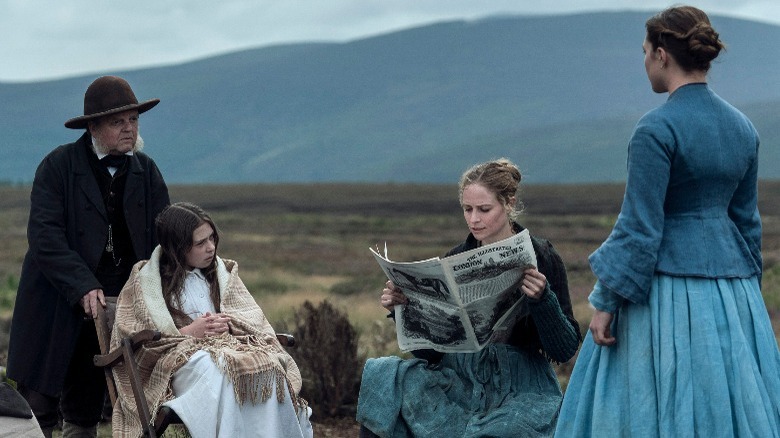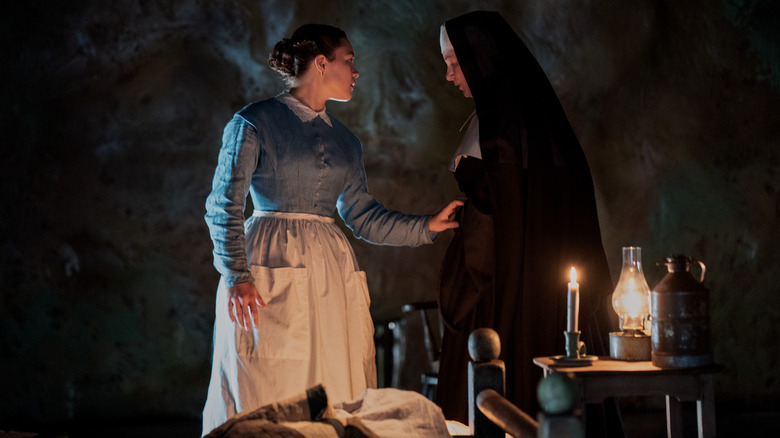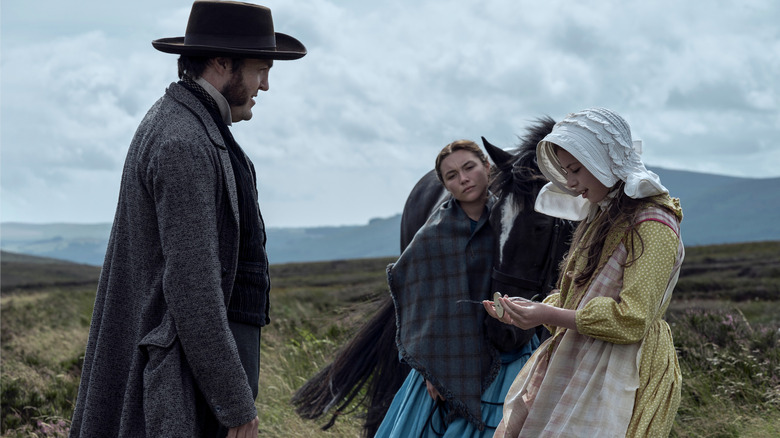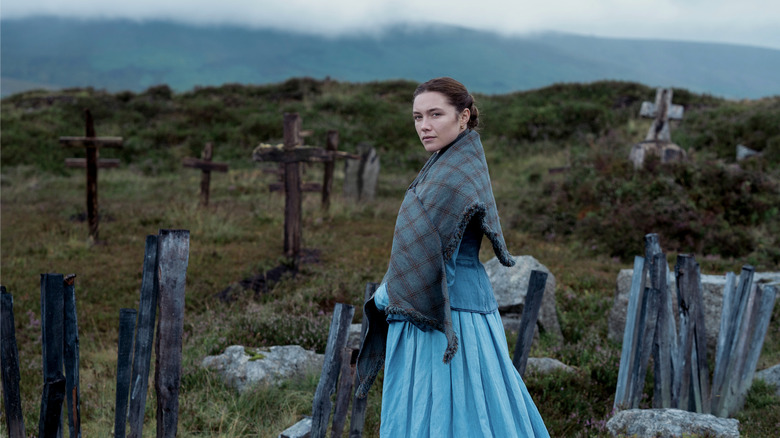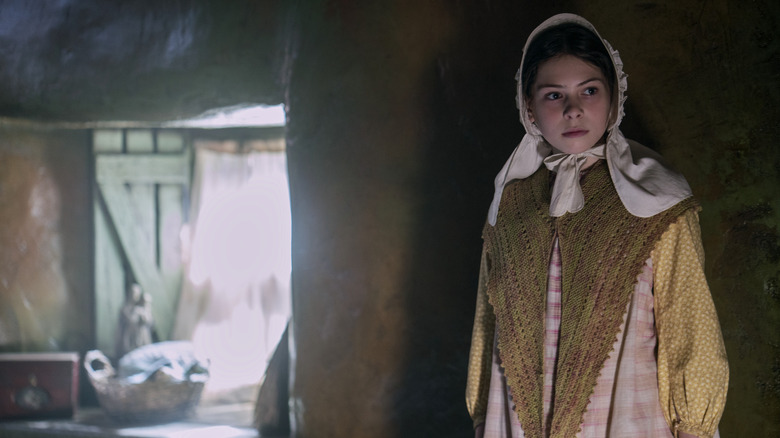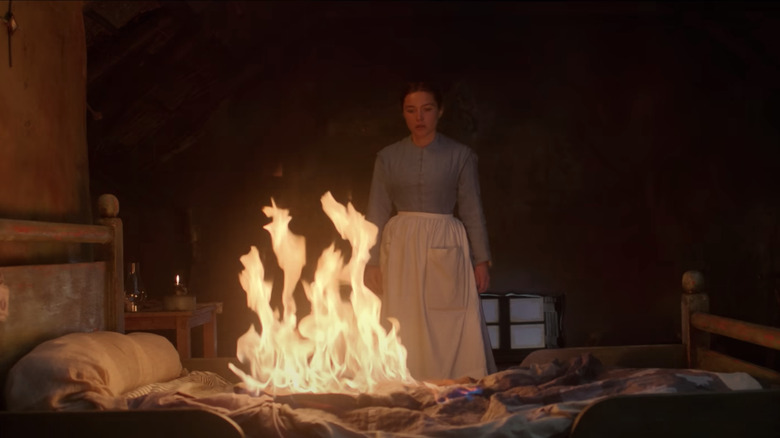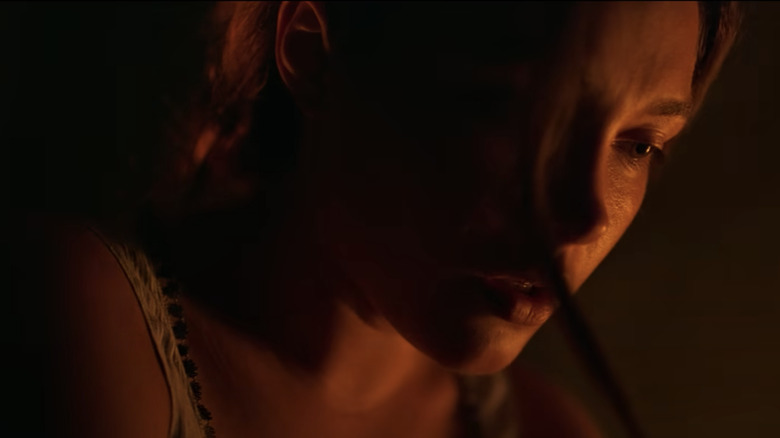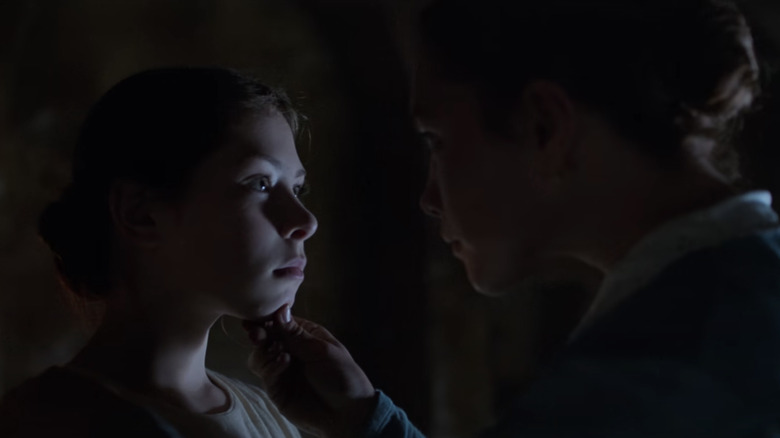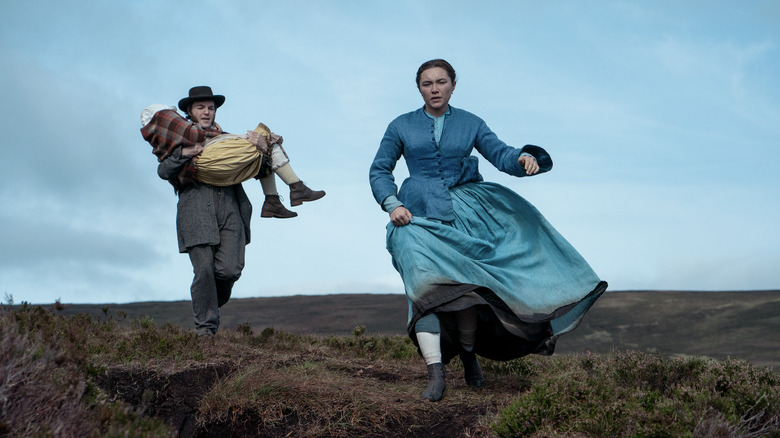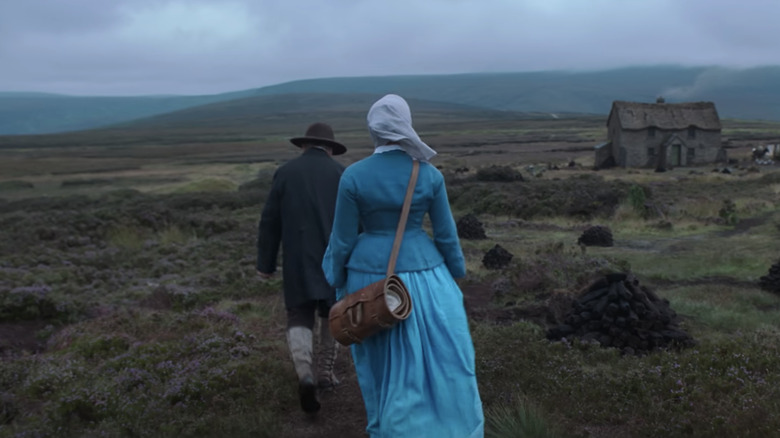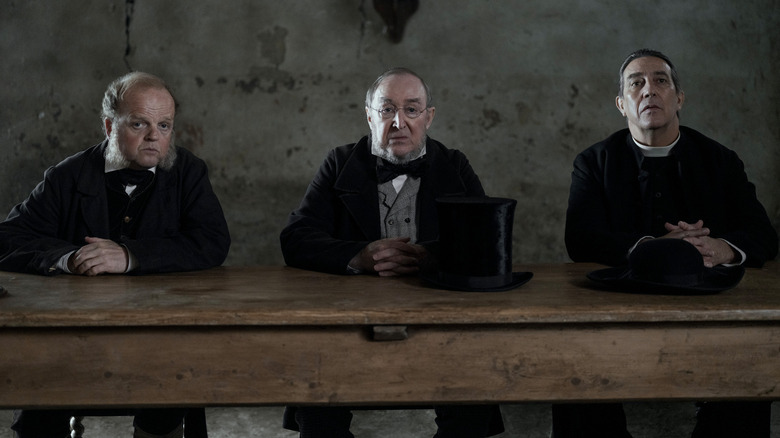Small Details You Missed In Netflix's The Wonder
The following article includes details of sexual assault, self-harm, and eating disorders.
Netflix's new movie starring Florence Pugh might end up being their best-reviewed original film of the year. Released in theaters and on the streaming service in November, "The Wonder" is an adaptation of Emma Donoghue's 2016 novel of the same name. In fact, Donoghue even wrote the initial script adaptation — though director Sebastian Lelio and Alice Birch wrote the final draft of the screenplay (via Deadline).
While the dialogue and narrative are compelling, telling the story of a 'fasting girl' from Ireland in 1862 (yes, fasting girls were a real thing), the level of acting in "The Wonder" is fantastic. Florence Pugh stars as Mrs. Wright, or Lib, a Nightingale nurse tasked with watching an 11-year-old Irish girl, Anna (Kíla Lord Cassidy), who hasn't eaten in months. Pugh has starred in several dark thriller films, most notably high-profile projects like "Midsommar," "Don't Worry Darling," and now "The Wonder."
"The Wonder" grapples with the dichotomy of science and belief, as it's set in the devoutly Catholic Irish countryside only a few years after the Great Famine of the 1840s. For director Sebastián Lelio, Lib is the "rationalist confronting this community of fervent believers," a situation that felt "very 2022, faith versus science or nationalism versus magical thinking" (via Deadline). While the ending of "The Wonder" is ambiguous, there are loads of clues throughout the film for attentive viewers. Here are 11 small details from "The Wonder" that we all might have missed.
The importance of stories
Even though "The Wonder" is a period drama set in 1862 — as the narrator tells us in the beginning — the film's first images are of a modern film set. The narrator, a tremendous Niamh Algar, who also plays Kitty O'Donnell, tells us that the film is fiction, though we're encouraged to believe it. "The people you're about to meet, the characters, believe in their stories with complete devotion," the narrator tells us. "We are nothing without stories."
We understand immediately that "The Wonder" is about the juxtaposition of fiction, illusion, belief, and truth. While the beginning and end of "The Wonder" happily break the fourth wall, revealing a behind-the-scenes glimpse of the set, there's one more instance of this during the film, when Lib goes to Kitty asking for details about when Anna last ate. When Kitty tells her that Anna last ate the body of Christ at her communion on her 11th birthday, she posits that it was a miracle. Lib responds, "That's a story, Kitty. I'm looking for facts."
Kitty scoffs at Lib and answers, "I dig up turf, and you dig up the truth. So you also need your stories. You write them down in that little notebook of yours. It's quite the bible you got going." Lib leaves, uncomfortable with the comparison when suddenly Algar's narration is back. "Hello again," she says. "I told you we are nothing without stories." Meanwhile, Kitty stares at the camera, breaking the fourth wall one more time.
It starts and ends with a ship
The first few moments of "The Wonder" show us a modern-day film set. The camera tracks over a wooden house on some scaffolding, what might be the O'Donnell's house, rigging, and camera cables, finally landing on the set of a ship. Young travelers are curled up in bunks, and there's soft lighting trailing down from the hatch above as Mrs. Wright travels alone, eating a bowl of stew at a wooden table. "There sits a nurse," Kitty tells us, adding, "An English nurse."
At the end of the film, the audience and Mrs. Wright (now called Elizabeth Cheshire) have come full circle. The final scenes of the movie show Lib sitting at a full table, piled high with cakes and treats, her hair done properly, and wearing new clothes. She's no longer alone as she now sits with her new makeshift family of Anna (now called Nan) and Will. This time, she's clearly traveling in style in first class. Just like before, the camera keeps panning, revealing that we're still in the same set as we were at the film's beginning. What's changed?
The spinning of the bird
When he meets young Anna, journalist Will Byrne (Tom Burke) hands her a thaumatrope, a popular toy in the 19th century that shows a bird on one side of a paper and a cage on the other. Spinning the paper back and forth revealed the illusion of a bird in a cage. Pulling the threads on the side to rotate the paper, Anna asks, "Is it trapped, or is it free?" Will tells her she'll have to decide for herself, and as the camera focuses on the thaumatrope, the cage is superimposed on Lib's face -– is she trapped, or is she free?
Sitting in bed, Anna spins the thaumatrope again at night, whispering the words, "In. Out. In. Out," as Lib watches her. These words are echoed again in the film's final words, when the film pans out from the ship, revealing the film set again, and Kitty stands there in modern clothes and says to the camera, "In. Out. In. Out." The meaning here is that, whether in the set or out of the set, each is just a story.
Blue and green are everywhere
The stark setting of "The Wonder" provides an important background for the film. Filmed outside of Dublin, with the mountain views shot in County Wicklow, most of the houses we see are rough and tumble, with pitted walls and bare wooden floors. According to a CinemaDaily interview with Pugh, she marched for hours in the cold scenery to get those shots, saying, "by the end of the film, when you see all of the mud halfway up my leg, that was from hours of marching across marsh. It was real mud."
Yet, almost every single exterior and interior of the village is painted the same green color. Viewers might have noted the green door at the O'Donnell's house, which also had green walls. The lodgings where Lib stays feature green walls throughout, including in her room. However, for most of the film, Lib wears a plain, bright blue dress without any pattern. This contrasts with the environment around her as well as the attire of the other women.
As Lib sits at Anna's desk one night, she holds a small statue of the Virgin Mary in her hands, and the shawl over the statue's head is the exact same color as Lib's clothing. This is a symbol of her purity, her status as a Nightingale nurse, and as a caregiver for Anna. However, by the end of the film, her final dresses are much different — brightly patterned, with small flowers and stripes.
The holy well and dumplings
In the world of "The Wonder," there's a holy well not far from the O'Donnell's house, a fact that seems to heighten the mysticism surrounding young Anna. When Anna takes Will and Lib to the holy well, she tells them about the legend surrounding the well, saying, "Press a clootie to the hurt and tie it to the May tree. And when it rots away, the hurt will be gone." Will finishes the quote for her, familiar with the myth since he grew up in the same village.
By the end of the film, it becomes obvious to Lib that Anna will die without intervention. Banking on Anna's belief in the well, Lib tells Anna that she's about to die but will wake up again as Nan. Lib wets a clootie downstairs in the house and puts it into her pocket to take with them to the holy well, just like in the old legend.
Anna wakes up, presumably, as Nan and Lib feed her a bite before setting the clootie down next to her and leaving to set the house on fire. Just as in the rhyme, Nan should be fine once the clootie is gone. For Pugh, Lib must become a "believer in order to make Anna [Kíla Lord Cassidy] change. That's what's so fascinating — it's the ultimate manipulation, and so morally interesting because it's wrong, but it's right," she told CinemaDaily.
The flames and a name
At the film's end, Lib lights Anna's room on fire, smashing the laudanum and leaving behind the baby booties she carries. According to Pugh, those were real flames that surrounded her in the house, and she wasn't acting, "I was totally scared," she told CinemaDaily.
Now that everyone believes Anna is dead, she adopts Nan, obviously giving her a better life where she won't be blamed for her own sexual assault. Still, the audience is left to wonder — was Nan the name of Lib's baby who died? From her earlier conversation with Will, we know that Lib's child was a girl. Beyond that, when she offers Anna nicknames for her, the last one she chooses is Nan, which Anna agrees to, though she says, "But then I would be someone else."
Has Anna (now Nan) taken the place of her lost baby? As she burns the house down, a bit of flame lights her hand, possibly indicating her complicity in using Nan to achieve her ends and assuage her grief.
If you or anyone you know has been a victim of sexual assault, help is available. Visit the Rape, Abuse & Incest National Network website or contact RAINN's National Helpline at 1-800-656-HOPE (4673).
The blood on the handkerchief
"The Wonder" has a bit of an obsession with blood. Firstly, Anna says a fairly graphic prayer 33 times a day, whispering, "sprinkled and stained with his precious blood," repeatedly. Secondly, Anna loses one of her teeth as she becomes weaker and weaker, spitting the tooth into Lib's open palm, where it sits in a pool of bright red blood in an image that calls to mind the crucifixion.
Further, every night before bed Lib lovingly unwraps a blood-stained handkerchief where she keeps a pair of baby booties and a bottle of medicine which is clearly laudanum, a mixture of opium popular at the time (via Smithsonian Magazine). Each night she takes a spoonful of the laudanum and pricks her finger (drops of blood scatter the handkerchief), sucking on the blood that wells up from her finger. Is this an atonement for the loss of her baby? For her own failures as a mother?
Throughout the film, the theme of motherhood, particularly combined with the loss of a child, crops up again and again. Not only is Lib suffering from the loss of her daughter, but similarly, Rosaleen (Elaine Cassidy) has been traumatized by the loss of her son, Patrick.
If you or someone you know needs help with mental health, please contact the Crisis Text Line by texting HOME to 741741, call the National Alliance on Mental Illness helpline at 1-800-950-NAMI (6264), or visit the National Institute of Mental Health website.
Anna has some big boots to fill
Patrick's death hangs over the O'Donnell family and is, we eventually understand, the catalyst for Anna's fasting. While walking one day, Lib mentions Anna's large boots, noting that they seem too big for her. Anna tells her they were her brother Pat's shoes — Anna must literally fill the boots of her brother who died.
Anna's parents, Rosaleen and Malachy (Caolan Byrne), adored their son and have placed the burden of his death on Anna, even telling Anna that it's her fault her brother died. "And mammy said that it was my fault he'd been taken," Anna tells Lib. "He takes his best angels home early," Rosaleen says when Lib confronts her over the fact that Anna will die soon, clearly also referring to her son's death. "This life is so short, Mrs. Wright. The next is for eternity. My children will be in heaven," Rosaleen says before heading downstairs.
Eagle-eyed viewers might have realized that Anna looks very similar to her mother, Rosaleen. In fact, when their profiles are turned to the camera, they look identical. The reason for this? Rosaleen, Elaine Cassidy, is the real-life mother of Anna, Kíla Lord Cassidy. "They're this powerhouse family," Pugh told CinemaDaily.
If you need help with an eating disorder, or know someone who is, help is available. Visit the National Eating Disorders Association website or contact NEDA's Live Helpline at 1-800-931-2237. You can also receive 24/7 Crisis Support via text (send NEDA to 741-741).
An obsession with stories and sinners
It's no shock that a film centered on religion might also focus on the dichotomy of saints and sinners. However, "The Wonder" seems to center more around sinners and the stories they tell as well as the stories about them. "Anyone can be chosen, saints or sinners," Anna tells Lib as she plays with the saint cards on the floor. Realizing that Anna is worried about her brother's soul, Lib responds, "Surely your brother's in heaven, Anna." However, Anna replies, "We can't know that, Mrs. Lib."
Later, when Anna recounts her horrifying history with Patrick, she says that he told her their actions were a "double love" because they were brother and sister. "Love is forever; he told me like it was a story," she says as Lib sits in silence, stunned at the confession.
When Lib meets Will Byrne on the road one day, she tells him to ask Sister Michael (Josie Walker) for access to Anna. He scoffs at the idea and tells her, "She'll take a rod to me, I've sinned too much, and it shows." Lib responds, "It would make a good story, though."
This theme repeats again and again throughout the film until we land on the final twist, where Lib lies (a sin) and tells the most significant story to cover it up. Using the notebook where she's recorded Anna's declining health (a practice pioneered by Nightingale nurses), Lib weaves a story about Anna's death. According to Pugh, this is the key to the ending of "The Wonder," telling CinemaDaily, "Because these women were actually documenting why these people were dying, why these people were ill, and that's the whole twist of the movie. She then uses it all herself."
The constant image of Lib eating
"The Wonder" takes place in 1862, only a few short years after the Irish potato famine. Sadly, over a million people died during that time (via Brittanica), including Will Byrne's parents, who locked themselves into their cabin to avoid the shame of public starvation. This idea of hunger versus plenty follows Lib around the village as an Englishwoman. At the beginning of the film, we're introduced to Lib with the sentence, "The great famine still casts a long shadow, and the Irish hold England responsible for that devastation."
Throughout the film, Lib is constantly eating. With the camera facing her straight on, Lib eats at the lodging, on the ship, and at the O'Donnells. The image of Lib seated at a table with a bowl in front of her is so constant that it almost serves as a screen break. We see Lib eating at least eight times in a two-hour movie.
In her final moments in the village, the narrator reads Will's latest article, which fully lays the blame for Anna's supposed death on the village, saying, "Nor is the self-appointed committee required to explain why they supervised the starvation of one more Irish child." He writes that these "sins of omission" that have been committed by the village are a part of a larger national problem where young children are often condemned to "lie down and die in ditches and gutters."
Mirroring The Last Supper
Obviously, some religious iconography has to find its way into "The Wonder," considering its subject matter. However, much of the religious landscape of the 1800s was dominated by men. Mrs. Wright's position as a Nightingale nurse would have afforded her a higher status than was usually given to women at the time, especially since most Nightingale nurses were educated and well-traveled.
However, there is a very particular reference to one of the world's most famous religious paintings, "The Last Supper" by Leonardo Da Vinci. This famous painting shows Christ and his disciples at a long table. While Lib is receiving her orders about the watch, she stands in front of a long stark table, where five men sit, all facing her. The placement of each man echoes the famous painting, though rather than a feast, the table is completely empty, without food or water.
In "The Last Supper," the men are shocked as they learn that one among them will betray Christ. In "The Wonder," the five men sit in confident arrogance, never suspecting that, eventually, Lib will betray them by faking Anna's death and stealing her away from the village. Fans of period dramas might have recognized both Ciaran Hinds (Father Thaddeus) and Toby Jones (Dr. McBrearty) sitting at the table. These two actors had roles together in another recent release, Amazon's "The English," another psychological thriller about motherhood.
If you or someone you know is dealing with spiritual abuse, you can call the National Domestic Violence Hotline at 1−800−799−7233. You can also find more information, resources, and support at their website.
